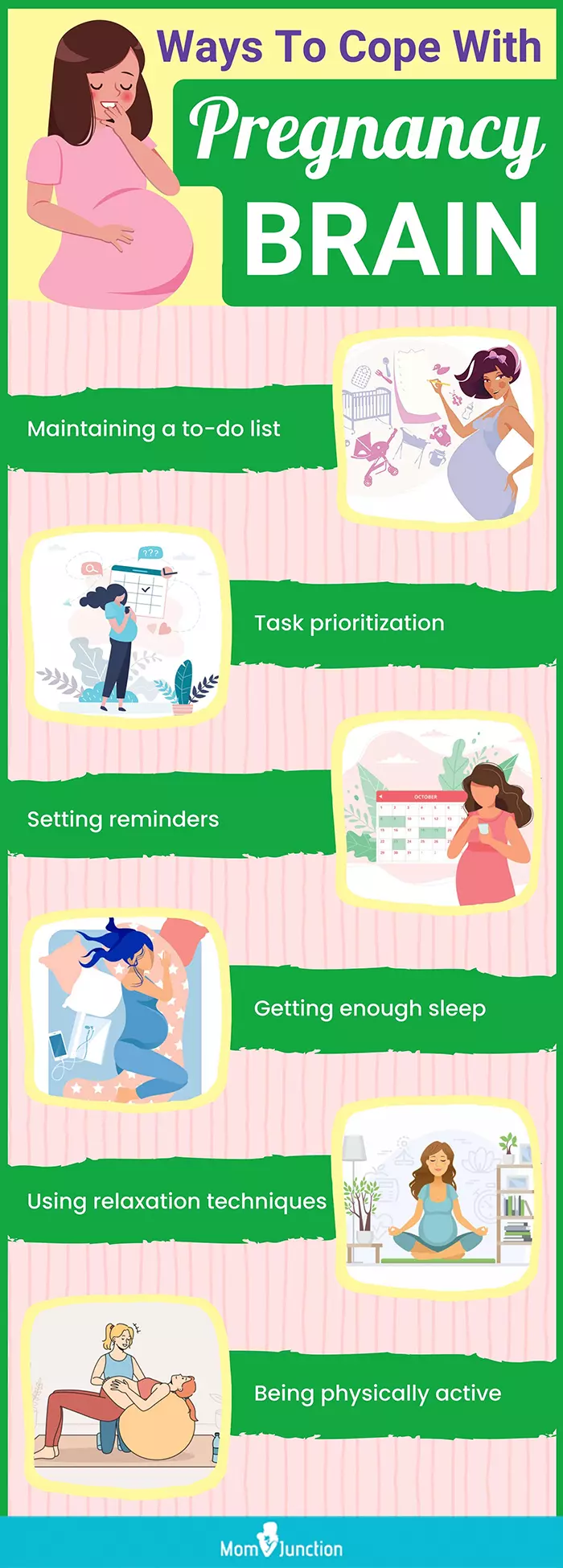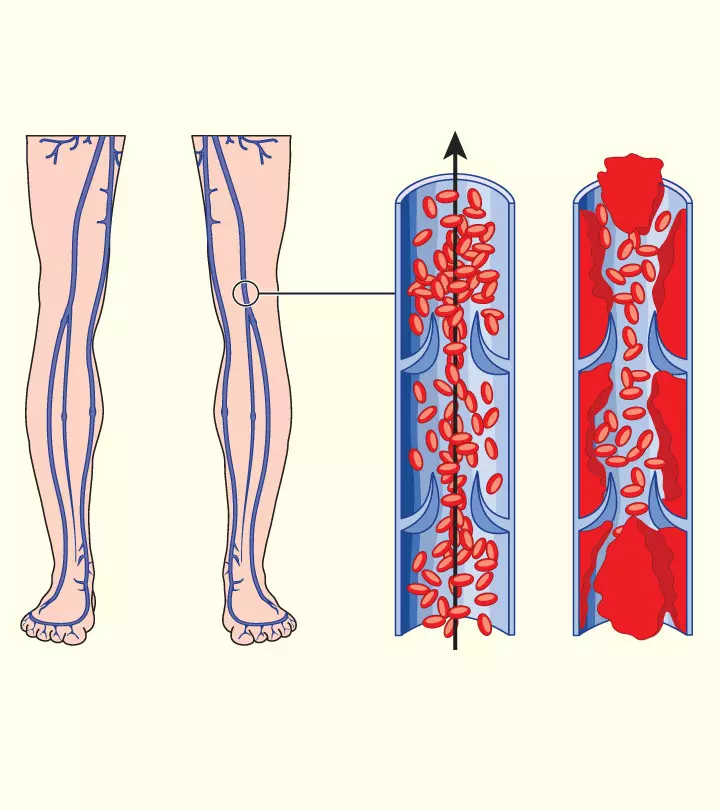
Image: Shutterstock
Have you ever wondered why details seem to be slipping your mind since your pregnancy? While pregnancy is known to cause a slew of changes of both physiological and psychological nature, a marked alteration may also occur in memory. This change, known as the ‘pregnancy brain,’ is associated with the inability to carry out your to-do lists and other cognitive tasks efficiently. While it is a relatively regular occurrence, you may need to find ways to work around these lapses. This article gives you all the information you need on pregnancy brain fog to cope with it efficiently.
Key Pointers
- Pregnancy brain refers to the forgetfulness and general absent-mindedness that occurs during pregnancy.
- Physiological changes in gray matter, hormonal changes, and other factors contribute to brain fog.
- Pregnancy forgetfulness does not require treatment but can be remedied using techniques like maintaining a task list, delegating, and practicing relaxation.
- Pregnancy brain could change the mother’s brain, but it does not affect the development of the baby and has no known effect on lactation.
What Is Pregnancy Brain?
The pregnancy brain, also known as mommy brain, maternity brain, maternal amnesia, or momnesia, refers to spasmodic occurrences of forgetfulness that occur during pregnancy and continue postpartum. This can range from general absent-mindedness to verbal memory problems and significant issues recalling organized information (1) (2). Brain fog begins around the time the mother is 5 weeks pregnant when the baby’s organ development has already started (3).

Image: Shutterstock
While several speculations and myths surround pregnancy forgetfulness, there is no evidence suggesting pregnancy brain fog is a debilitating condition. Thus, it does not require treatment as it poses no evident threat to the mother’s health or the baby’s development.
 Research finds
Research findsIs Pregnancy Brain Normal?
Pregnancy brain is relatively common and is seen to be reported by around fifty to eighty percent of pregnant women during and after pregnancy
(5). A study on memory loss in pregnancy indicated that 81 percent of the study sample reported a memory impairment. In addition, the test results quoted in the study demonstrated significant deficits in test performances involving recollection and priming memoryiA process in which an encoded response is unintendedly presented to subsequent stimuli (6). However, contradictions continue to arise in the form of anecdotal studies and self-assessment reports on the factual modality of this condition.
What Are The Symptoms Of Pregnancy Brain?
A few identifiable signs and symptoms of pregnancy brain include (2) (7):
- Brain fog
- Impaired attention and concentration
- Mental fatigue
- Coordination issues
- Problems in learning new things
- Issues with recollecting information
- Problems in paired associationiA brain process establishing a relationship between a stimulus object and an emotional or behavioral response and naming
- Problems in organizing information
- Misplacing things
Allison, a mother of three boys, opens up about the impact of pregnancy brain on her daily life. She shares, “I would consider myself a very organized and well thought out Type A gal, but since becoming pregnant…I’m a total airhead. Pregnancy brain is very real, people. Before I was pregnant, I hardly ever lost things…Since becoming pregnant, I have lost both my keys and my favorite jacket. (Keys have since been found; the jacket is still MIA). I also manage to leave my purse behind almost everywhere we go… I’ve always been bad with directions, but since becoming pregnant, it has gotten worse. I went to visit my father-in-law at the wrong hospital after his hip surgery even though I knew exactly where I was supposed to be going (i).”

Image: IStock
 Point to consider
Point to considerWhat Causes Pregnancy Brain?
Physical, chemical, and psychological causes lead to cognitive and structural changes in the maternal brain, influencing the onset of pregnancy brain.
While research is still underway on several of these factors, here are a few known contributors to pregnancy forgetfulness.
1. Hormonal changes
Pregnancy is marked by changes in essential hormones such as estrogen, progesterone, oxytocin, and prolactin. Several studies indicate that these changes in estrogen and progesterone affect the hippocampus, causing cell loss and verbal memory loss (7) (9). Oxytocin is another hormone associated with significant impairment in memory performance and recall (10).
2. Stress
The ongoing physiological and psychological adaptations and lack of adequate sleep during pregnancy can cause the body to change cortisol levels. An increase in these levels during stress is linked with brain or mental fog (5). In addition, prenatal glucocorticoidsiAn important steroid hormone extracted from cholesterol that facilitates fetal adrenal development also affect the hippocampus functioning during pregnancy causing problems in memory and recall (9).

Image: IStock
3. Other causes
Health conditions such as anemia, neurological problems, thyroid dysfunction, head trauma, auto-immune disorders, and recurrent epileptic seizures cause brain fog and cognitive changes in pregnant women (11) (12). In addition, changes in the maternal immune system, depression during pregnancy, antepartum depression, and thiamine deficiency-induced Wernicke encephalopathyiA degenerative disorder characterized by neurological symptoms occurring due to vitamin B1 deficiency have also been linked with diminished cognitive functioning and pregnancy brain fog (13) (14) (15).
 Quick fact
Quick factHow Does The Brain Change In Pregnancy?
Longitudinal studies indicate that pregnancy can cause relatively permanent changes in the brain’s gray matter in mothers. A process similar to synaptic pruning occurs in the brain where the gray matter gets reduced in volume, helping the mother focus more on her baby (17) (4).

Image: Shutterstock
In addition, the increased production of prolactin, which influences lactation and parent-child bonding, also plays a role in growing maternal instincts by inducing relatively permanent adaptations in the maternal brain (18). However, while it is helpful in bonding with their babies, very little is known about its negative consequences and contribution towards the onset of pregnancy brain.
What Are The Measures To Cope With Pregnancy Brain?
Pregnancy brain and its induced discomfort can be remedied using a few simple strategies.
1. Use lists
Writing down a list of tasks, important appointments, and other assignments can help you stay connected with routine work. Labeling items, using a recipe book, and making grocery lists will also help keep track of other domestic work that needs to be done.
2. Prioritize
Arrange the tasks in sequential order based on their importance, urgency, and difficulty to avoid cramming and multitasking. Also, ensure a delegation protocol for tasks that need not require your personal attention.
3. Set reminders
Using a phone or e-calendar to set reminders will help keep track of your work. Reminders can also be set for drinking water, mealtimes, medications, and exercising to avoid skipping routines.
4. Be active
Physical activity helps keep the body fit and healthy while also being beneficial for the baby’s growth. While it is not essential for the mother to perform strenuous physical exercises, an occasional walk in nature or yoga can help relieve stress.

Image: IStock
5. Eat healthy
It is important to maintain a diet chart and water log for you to keep yourself and your baby healthy. A maternal diet can help reduce stress during pregnancy and protect the body from health risks.
6. Get sleep
Sleep deprivation can affect your cognitive performance and induce stress. Thus, make it essential to maintain a sleep schedule, including naps, so that you are not exhausted.
7. Relax
It is essential for the mother to be stress-free during pregnancy to ensure healthy baby development. Practicing relaxation techniques, indulging in hobbies, and being around people who make you happy can play a major role in keeping you healthy.
8. Seek help
It is best for you and your baby to seek help when in physical or mental distress. Any anxiety about forgetfulness, the baby, your family or spouse, and the delivery process can be addressed by being informed and expressing your needs. Also, seeking medical help for any adverse indications will also put your mind at ease about the baby’s well-being.
Frequently Asked Questions
1. What can partners, family, or co-workers do to help?
Partners and family can help ease pregnancy brain-induced discomfort by helping share their workload, setting reminders, being supportive, and acknowledging the physical strain of pregnancy (1).
2. Can meditation help with pregnancy brain?
Meditation-based mindfulness interventions have been proven to affect pregnancy brain functioning positively (19).
3. Can pregnancy brain affect a woman’s memory or ability to learn new things?
Pregnancy brain might temporarily impair a woman’s working memory, verbal memory, and processing, which might impede her ability to learn new things (20).
Pregnancy brain refers to lapses in memory resulting from a series of changes in the mother’s brain structure, hormones, sleep patterns, diet, and psyche. While it does not have a life-threatening effect on the fetus, it is essential to understand the signs and take measures to cope with them to avoid stress for the mother. Keeping reminders, seeking help, being in positive surroundings, getting enough rest, and having balanced nutrition can help reduce stress and remedy the severity of pregnancy brain fog.
Infographic: Measures To Cope With Pregnancy Brain Fog
Pregnancy brain can feel distressing to the mother due to an inability to stay organized with memory and task performance. However, a few methods can help cope with brain fog symptoms. Here is an infographic containing a few ways to manage the condition during pregnancy. Illustration: Momjunction Design Team
Illustration: Pregnancy Brain: Causes Effects And Ways To Manage It

Image: Stable Diffusion/MomJunction Design Team
Personal Experience: Source
MomJunction articles include first-hand experiences to provide you with better insights through real-life narratives. Here are the sources of personal accounts referenced in this article.
i. Thoughts on my becoming an airhead.https://nestfuloflove.blogspot.com/2014/07/thoughts-on-my-becoming-airhead.html
References
- Is ‘pregnancy brain’ real or just a myth?.
https://utswmed.org/medblog/pregnancy-brain/ - Giulia Barda et al.; (2016); The effect of pregnancy on maternal cognition; National Center for Biotechnology Information.
https://www.ncbi.nlm.nih.gov/pmc/articles/PMC4839972/ - Pregnancy: Signs, Symptoms and Health.
https://onlinenursing.regiscollege.edu/guide-for-first-time-parents/pregnancy-signs-symptoms-and-health/ - Martínez-García et al.; (2021); Do Pregnancy-Induced Brain Changes Reverse? The Brain of a Mother Six Years after Parturition.
https://pubmed.ncbi.nlm.nih.gov/33525512/ - Memory Loss In Pregnancy: Myth Or Fact?.
https://www.ifwip.org/memory-loss-pregnancy-baby-brain-momnesia/ - K. Sharp et al.; (1993); Memory loss during pregnancy.
https://pubmed.ncbi.nlm.nih.gov/8476824/ - Brett and Baxendale; (2001); Motherhood and memory: a review.
https://pubmed.ncbi.nlm.nih.gov/11259856/ - Diane Farrar et al.; Assessment of cognitive function across pregnancy using CANTAB: a longitudinal study.
https://pubmed.ncbi.nlm.nih.gov/24321198/ - Laura M Glynn; (2014); Giving birth to a new brain: hormone exposures of pregnancy influence human memory.
https://pubmed.ncbi.nlm.nih.gov/20304563/ - Markus Heinrichs et al; (2004); Selective amnesic effects of oxytocin on human memory.
https://pubmed.ncbi.nlm.nih.gov/15501488/ - What Is Brain Fog and What Can Help It?
https://rightasrain.uwmedicine.org/mind/well-being/what-is-brain-fog - Epilepsy During Pregnancy.
https://www.urmc.rochester.edu/encyclopedia/content?contenttypeid=90&contentid=p02474 - All About Pregnancy Brain.
https://thewell.northwell.edu/pregnancy/pregnancy-brain - Ouellette and Hampson; (2019); Memory and affective changes during the antepartum: A narrative review and integrative hypothesis.
https://pubmed.ncbi.nlm.nih.gov/29973120/ - Cho et al.; (2020); Acute amnesia during pregnancy due to bilateral fornix infarction: A case report.
https://www.ncbi.nlm.nih.gov/pmc/articles/PMC7559690/ - Abbie C Johnson et al.; (2022); Experimental Preeclampsia Causes Long-Lasting Hippocampal Vascular Dysfunction and Memory Impairment.
https://pubmed.ncbi.nlm.nih.gov/35615682/ - Elseline Hoekzema et al.; (2017); Pregnancy leads to long-lasting changes in human brain structure.
https://pubmed.ncbi.nlm.nih.gov/27991897/ - D R Grattan; (2001); The actions of prolactin in the brain during pregnancy and lactation.
https://pubmed.ncbi.nlm.nih.gov/11589128/ - Anjulie Dhillon et al.; (2017); Mindfulness-Based Interventions During Pregnancy: a Systematic Review and Meta-analysis.
https://www.ncbi.nlm.nih.gov/pmc/articles/PMC5693962/ - Jessica F Henry and Barbara B Sherwin; (2011); Hormones and cognitive functioning during late pregnancy and postpartum: a longitudinal study.
https://www.ncbi.nlm.nih.gov/pmc/articles/PMC4839972/
Community Experiences
Join the conversation and become a part of our nurturing community! Share your stories, experiences, and insights to connect with fellow parents.
Read full bio of Dr. Holly Schiff
Read full bio of Apoorva K
Read full bio of Rebecca Malachi
Read full bio of Reshmi Das



















